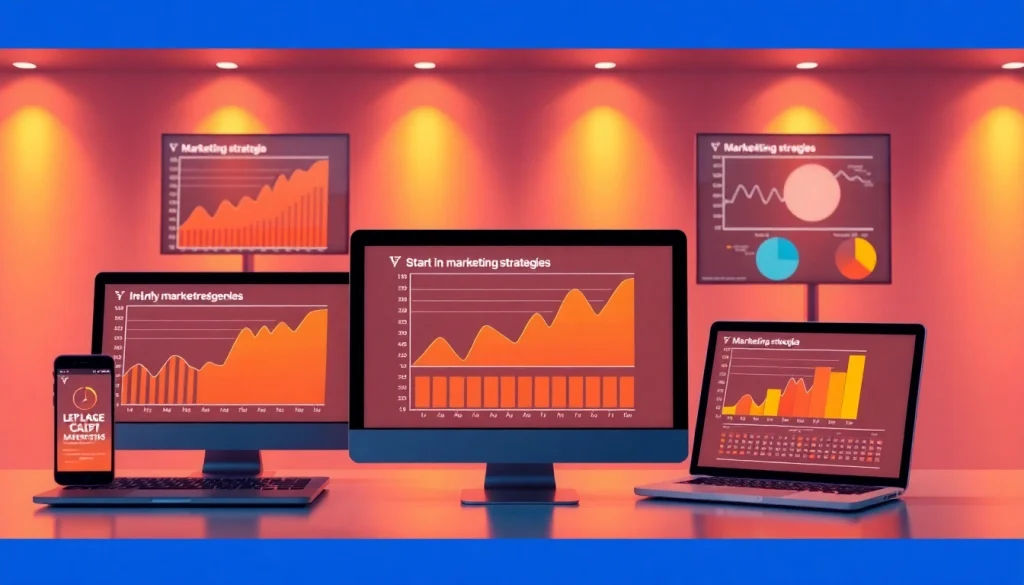Top AI Marketing Tools to Elevate Your Business Strategy

Understanding AI Marketing Tools
What Are AI Marketing Tools?
AI marketing tools are software applications powered by artificial intelligence technologies that assist businesses in various marketing functions. These tools automate workflows, provide predictive analytics, and enhance personalization of marketing campaigns, leading to more effective customer interactions. Over recent years, these solutions have gained traction as essential components in digital marketing strategies, allowing companies to optimize their operations and achieve better business outcomes. For those looking to explore how AI can reshape their marketing landscape, resources like AI marketing tools are invaluable for insights and practical applications.
How AI Tools Enhance Marketing Strategies
AI marketing tools enhance marketing strategies by enabling businesses to gather and analyze vast amounts of data quickly. This capacity allows marketers to gain insights into customer behavior, preferences, and trends that were previously unattainable. Techniques such as predictive analytics provide foresight into customer purchasing patterns, enabling companies to tailor their marketing strategies accordingly. Furthermore, AI tools facilitate personalization at scale, allowing marketers to craft targeted content that resonates with individual consumers, thereby increasing engagement and conversion rates.
Common Misconceptions About AI in Marketing
Despite their benefits, there are several misconceptions about AI marketing tools. One prevalent belief is that these tools eliminate the need for human marketers. While AI can automate many tasks, the human element remains critical in strategizing, creativity, and relationship-building. Another misconception is that AI tools are too complex to implement or require extensive technical knowledge. In reality, many platforms are user-friendly and designed with marketers in mind. Understanding these nuances is essential for businesses looking to integrate AI into their marketing efforts successfully.
Key Features of Effective AI Marketing Tools
Data Analysis and Customer Insights
Effective AI marketing tools leverage advanced analytics to interpret customer data. They analyze historical data to uncover patterns and trends, giving marketers actionable insights for decision-making. Features such as customer segmentation, behavior prediction, and trend analysis enable businesses to approach their audience with precision. For example, platforms like Jasper exemplify tools that harness data to create personalized content, ensuring that marketing messages hit the mark.
Content Creation and Optimization
Content is central to digital marketing strategies, and AI tools like Surfer SEO and Writesonic are revolutionizing how marketers create and optimize content. These applications can produce high-quality written content in a fraction of the time it would take a human, aided by algorithms that analyze SEO performance, keyword placements, and readability scores. Consequently, marketers can focus on high-level strategy while AI handles routine writing and editing tasks.
Social Media Management Solutions
AI tools also simplify social media management by automating content distribution and providing analytics on engagement. Tools like Buffer and Hootsuite utilize AI to determine the best times to post based on audience activity, optimize ad targeting through predictive modeling, and track campaign performance across different platforms. This capability not only saves time but also enhances the effectiveness of social media marketing efforts.
Top AI Marketing Tools in 2025
Comprehensive List of Leading Tools
As the demand for AI marketing tools continues to rise, several have emerged as leaders in the market. Here’s a glance at some of the top AI marketing tools to watch in 2025:
- Replo: Specializes in creating ecommerce landing pages that convert.
- Surfer SEO: Enhances content optimization strategies through data-driven insights.
- HubSpot: An integrated CRM that utilizes AI for lead generation and customer relationship management.
- Canva: Incorporates AI to help users design stunning marketing visuals effortlessly.
- Zapier: Automates workflows by connecting various apps for streamlined marketing processes.
Case Studies of Successful Tool Implementations
Success stories abound for companies utilizing AI marketing tools. A case study from a leading retail brand showcased how integrating Replo into their marketing strategy increased conversion rates by 30% within weeks of implementing AI-driven landing pages. Similarly, HubSpot’s AI features have enabled a tech startup to enhance their email marketing campaigns, resulting in a 25% increase in open rates compared to the previous year. These case studies exemplify the tangible benefits of adopting AI in marketing.
User Reviews and Feedback
User feedback is crucial in determining the effectiveness of AI marketing tools. Platforms such as Reddit and Product Hunt provide forums for marketers to share experiences and insights. According to user reviews, tools like Jasper and Surfer SEO are praised for their ease of use and the time they save in content creation and optimization. Marketers often highlight the welcome reduction in manual workload, allowing them to focus on strategic initiatives.
Choosing the Right AI Marketing Tool for Your Business
Identifying Your Marketing Needs
The initial step in selecting an AI marketing tool involves assessing your company’s specific needs. Understanding your target audience, identifying gaps in current marketing strategies, and setting clear objectives are critical for tailoring your search. For instance, if your goal is to enhance lead generation, prioritizing tools with strong CRM capabilities should be your focus.
Budget Considerations and Pricing Models
Budget is a significant factor when choosing AI marketing tools. Most tools operate on a subscription basis, with pricing varying depending on the features offered. Businesses should evaluate the ROI of the tools they consider, weighing their costs against potential gains in efficiency and sales. Conducting an analysis of different pricing models—such as pay-per-use or tiered pricing—is crucial in making informed decisions.
Trial and Testing Strategies
Before committing to any tool, businesses should take advantage of free trials or demo versions offered by many platforms. This hands-on experience allows marketers to explore functionality, assess user interfaces, and determine if the tool aligns well with their workflows. Gathering feedback from team members during the trial can also help gauge its effectiveness in real-world applications.
Future Trends in AI Marketing Tools
Emerging Technologies to Watch
The future of AI marketing tools looks promising, with several emerging technologies on the horizon. Natural Language Processing (NLP) improvements, for instance, will enhance the sophistication of chatbots, leading to more engaging customer interactions. Additionally, advancements in machine learning will fuel better predictive analytics capabilities, allowing marketers to forecast trends with greater accuracy.
The Role of AI in Personalization
Personalization will play a pivotal role in the future of marketing. AI-driven tools will enable a higher degree of customization by analyzing user data and behavior patterns. For example, tools that adapt content and offers based on individual user interactions will become standard, fostering deeper connections with consumers and significantly impacting brand loyalty.
Preparing for Developments in Marketing Automation
As AI continues to evolve, businesses need to remain agile and adaptable to the changing landscape. This may involve continuous learning and training for marketing teams to keep pace with technological advancements. Organizations should also cultivate an environment that encourages experimentation and innovation to fully leverage the capabilities of AI marketing tools.







